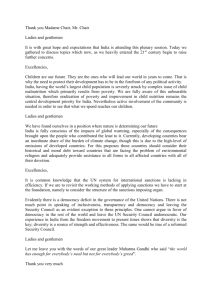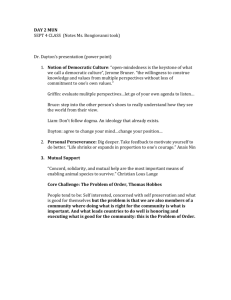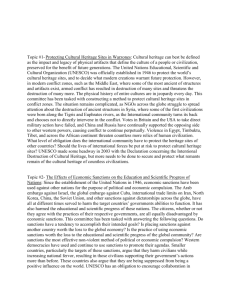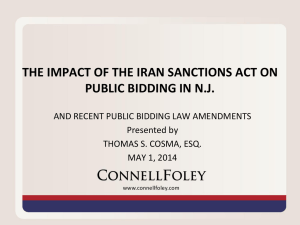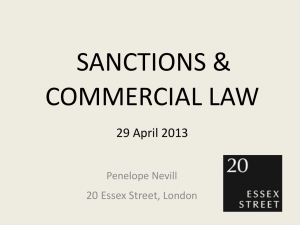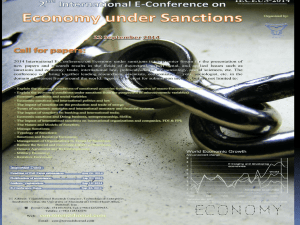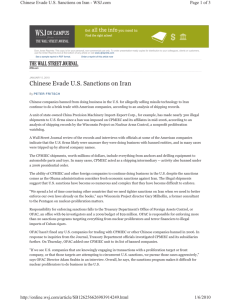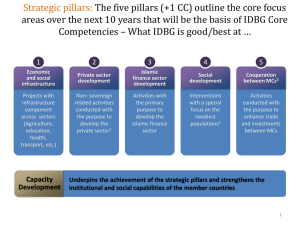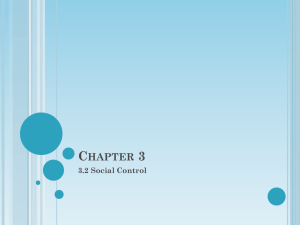Statement by His Excellency Mr. Kazem Gharib Abadi Deputy
advertisement
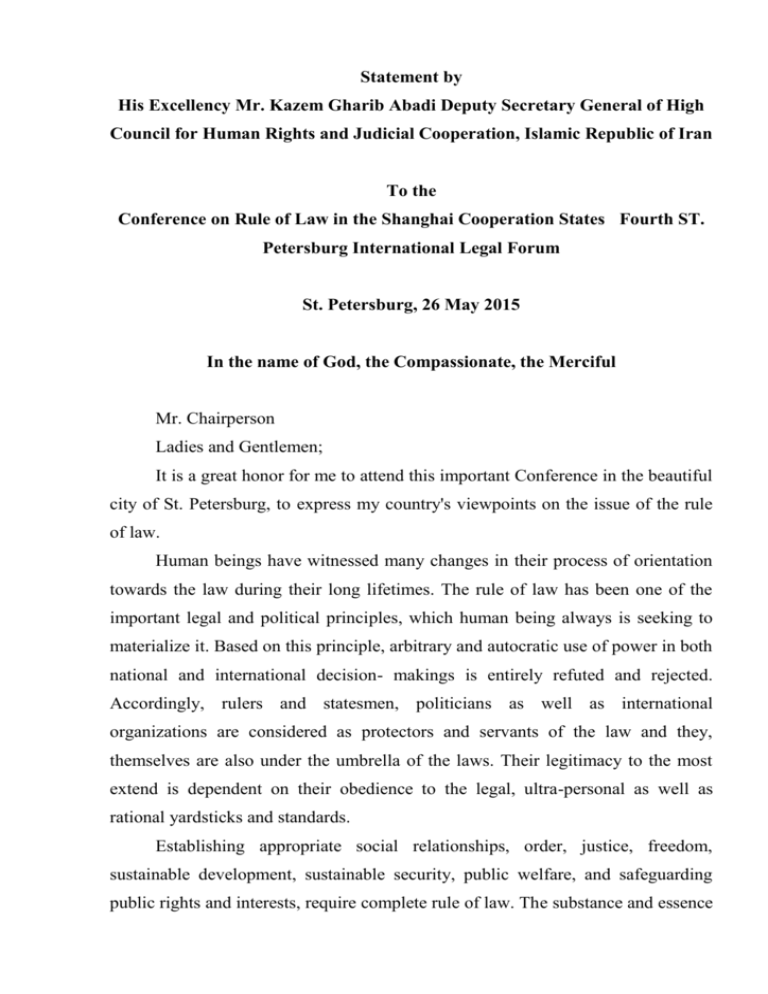
Statement by His Excellency Mr. Kazem Gharib Abadi Deputy Secretary General of High Council for Human Rights and Judicial Cooperation, Islamic Republic of Iran To the Conference on Rule of Law in the Shanghai Cooperation States Fourth ST. Petersburg International Legal Forum St. Petersburg, 26 May 2015 In the name of God, the Compassionate, the Merciful Mr. Chairperson Ladies and Gentlemen; It is a great honor for me to attend this important Conference in the beautiful city of St. Petersburg, to express my country's viewpoints on the issue of the rule of law. Human beings have witnessed many changes in their process of orientation towards the law during their long lifetimes. The rule of law has been one of the important legal and political principles, which human being always is seeking to materialize it. Based on this principle, arbitrary and autocratic use of power in both national and international decision- makings is entirely refuted and rejected. Accordingly, rulers and statesmen, politicians as well as international organizations are considered as protectors and servants of the law and they, themselves are also under the umbrella of the laws. Their legitimacy to the most extend is dependent on their obedience to the legal, ultra-personal as well as rational yardsticks and standards. Establishing appropriate social relationships, order, justice, freedom, sustainable development, sustainable security, public welfare, and safeguarding public rights and interests, require complete rule of law. The substance and essence 2 of the law must be fair and based on wisdom and sagacity. The law has to be inclusive, take into account public legal interests and have the capacity to deter any possible oppression from the lawbreakers. The laws involving discrimination among people cannot attain legitimacy and acceptability. Law must be enforced equally and with no exception, and each and every individual should be given equal rights. Justice has always been one of the main ideals and goals of humanity, and human beings' tendency and interest towards justice is inherent within them. The basis of world-view in the Islamic thought is upon justice. Considering this approach, Islamic Republic of Iran is a country based on religious democracy and governed by divine laws and commands. According to our Constitution, the Judiciary is independent from the other two power branches, namely Executive and Legislative, entrusted with the duty of protecting individual, civil and social rights and is responsible to implement and materialize the justice in the society. Relying on independence rule, the Judiciary and judges can bring any person to trial due to their attributed accusation, apart from their occupational features as well as personality traits, in order for the justice to be exercised .The pivotal basis in the Islamic judicial system is the "right" and the judge is obliged to find out and explore the "truth". Islamic Republic of Iran has always supported rule of law as well as administration and expansion of justice in international arena. In this context, use of force and threat to use of force, interference in the internal affairs of others as well as taking coercive economic and trade measures and also other illegal actions have been rejected and instead, peaceful settlement of international disputes has been emphasized. Rule of law at international level is prerequisite for maintenance and promotion of the global peace and should be regarded as a guideline for collective response to the prevailing challenges. In line with this approach, the fundamental principles of the U.N Charter should be respected as a roadmap by the international community in consolidating a fair and lasting peace across the globe. Iran has 3 always stressed on the necessity of refraining from any use of force or threat to force in international relations the most important principle, which the U.N members committed themselves to ensure. Hence imposing unilateral economic sanctions are contrary to the rule of law and Iran has always invited all other countries to avoid of adopting any kind of unilateral economic, financial or traderelated measures contrary to the U.N Charter, preventing economic and social development of the countries and endanger the life of the peoples. Ladies and Gentlemen, Respecting to the obligations arising from international conventions, constitutes an important element in realizing the concept of the rule of law. Deviation from this direction by preferring national interest to the international obligations by certain powers and consequently undermining international regulations will lead to legal uncertainty in international relations with dire repercussions for global peace and security. Placing a certain country in a higher position than the other countries would be a green light to the dictatorship and chaos and would result in sacrification of security and justice. Non- interference, non- resorting to the force as well as the principle of the sovereign equality, could be recognized as the other major bases for governing the international relations. Non- interference in the internal affairs of states as a fundamental rule in international law is based on sovereignty, equality and political independence of the states. This rule imposes a legal obligation on the governments to refrain from interfering in internal affairs of others. The sovereign equality is the basis for intergovernmental relations, in which all governments are equal in their relevant sovereign rights. They could choose freely their own political, social and cultural system. If a certain government is to impose its will on the other, this will be construed as recalcitrance of international rules and regulations. It should be noted that ensuring the sovereign equality in not a simple job. Unfortunately, some great powers of the world are utilizing their own economic, military and political 4 superiority towards exerting their strong influence over other countries. Ladies and Gentlemen; The rule of law in international arena has been facing with diverse challenges such as abuse of right to Self-Determination as a political tool, false prescription for executive measures under Chapter VII of the U.N Charter, breaching peremptory norms of international law, conspiracy and plot for interference in internal affairs with the aim of regime change, recourse to the preventive and pre-emptive military actions. In this context, I would also like to refer to the Human Rights issue. The codification and respect of regulations on human rights must be a priority for all countries. The advancement of implementation and monitoring methods is not matching with standardizing process. Monitoring processes are proceeding in a not so exact direction. The primary means for the protection of human rights are domestic law systems. Foreign interference aimed at promotion of human rights standards often entails the escalation of the factional conflicts as well as augmentation of dissentions. Efforts towards sustaining hegemony over the others are being made in the name of respecting human rights and democracy. As this kind of behaviors are done in a manipulative manner and based on double standard policy, the peoples are getting skeptical to the values such as human rights and democracy. Respecting human rights and pledging to establish democracy cannot be justified through human rights violation, waging war against others, massacre and destruction of countries (which per se is a crime against peace). These actions are entirely contrary to the universally-accepted standards of international law. Regrettably, certain countries are, with no regard to cultural diversity among nations, pursuing the policy of imposing their own values and life styles as their single and unique human rights standards, having recourse to human rights issue as a political and propaganda instrument against independent countries. Claiming to be protectors of human rights, some countries are, however, suffering from 5 extensive violation of human rights in their own territories. Meanwhile they have turned a blind eye to the human rights violations of their friends and allies. So long as there is such an approach toward human rights issue, the mere victim will be of course the human rights! Another crucial issue in this regard is imposing sanctions. Though, based on Chapter VII of the U.N Charter, the authority to apply sanctions to maintain international peace and security rests with the Security Council, this authority is not, however, open-ended but bound to the conditions such as observing and implementing the U.N purposes and principles. Studies on repercussions left due to the sanctions on targeted countries show that sanctions cause damaging consequences to human rights as well as inflicting the most suffering on ordinary people as the prime targets. Taking into account some legal restrictions, which have been stipulated to the Security Council in the UN Charter, and particularly respect to the international law by the SC, the imposition of sanctions, which goes beyond these limits and violate Internationa I law, lacks the legal validity. So, the U.N members have no obligation in observing such sanctions. Unilateral sanctions are also against and contrary to the U.N charter as well as international law. They are, in fact, a type of intentional interference in the affairs of other countries. Moreover, all independent law societies unanimously believe that these sanctions are against human rights and put in jeopardy the developments of societies. Ladies and Gentlemen; As there is no universal law maker, judge or police, and taking into account cultural, social, economic and political differences among countries, the fundamental conception of international law as well as structure of international organizations should be reviewed in order to overcome the challenges and establish the effective global legal order. In this context, decision making in the UN shall be reformed to come up with more democratic and legitimate process. If the rule of law and democracy are among the fundamental principles of international law, then these principles should be also applied with respect to the 6 functions and responsibilities of international organizations as well. In conclusion, Mr. Chairperson, I would like to emphasize that prohibition of threatening or resorting to force in the relations among states, peaceful settlement of disputes, respect for sovereignty, honoring and fulfillment of international obligations by all states and respecting the legitimate rights of all countries should be the basis of rule of law an international legal order. Thank You for Your Attention.
